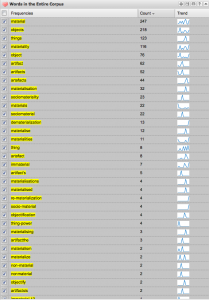This two-part piece was originally meant as a reply to the following post, by the pseudonymous “Dean Dad” (a blogger who acts as a dean at a community college):
The Tenure/Adjunct Dialectic
Partly because of Blogger’s limitations in comment-length, I decided to transform it into posts on this still-unpublicized teaching-focused site.
My basic claim is that the tenure system needs to be overhauled. In this first post, most directly related to that “Dean Dad” post, I’d like to rethink the relationship between the tenure system (tenure-track and tenured full-time professors) and “contract-based” teaching. In the latter category, I include diverse positions which are variously called “adjunct,” “part-time faculty,” “visiting lecturer,” or even “limited time appointment.” Yet my focus is on those positions which are assigned on a course-by-course basis (i.e., one contract per course).
A semi-disclainer… I’ve been teaching part-time, in different capacities and at different institutions, for several years. I originally envisioned a career through the tenure system but, for the time being, I’m more interested in other opportunities, including part-time teaching and freelance work.
So, my experience is quite different from that of a college administrator (like Dean Dad) or that of a full-time tenure-track professor. I did spend a year as a full-time visiting lecturer (through a teaching fellowship) and got to see the other side of “tenure/adjunct dichotomy.” I’ve also experienced the tenure track vicariously through my then-spouse or through other people close to me.
So the tenure system isn’t completely foreign to me, you might still say that I’m an outsider to the tenure system. Which makes sense. As we ethnographers are fond of saying, “you don’t ask a fish about water.”
Seems to me that a key issue is how people conceive of the tenure system itself. The fake dichotomy with adjuncts is part of this. But so is the notion that academic freedom is an exclusive prerogative of tenured professors or the notion that this type of job security should be preserved at all costs. Not to mention the points about sabbaticals, salaries afforded tenured faculty members, etc. In other words, the tenure system is “boxed in” as its own system.
Tenure is the way it is because all those things we get from tenure are related to the way tenure is. Or some such.
Talking about tenure, I would argue that people rarely think about higher education in the broadest possible way. Again, the “fish in water” problem. Or, more specifically, people usually think about their jobs. Whether or not they’re part of said “tenure system.” (One could argue that this system is so pervasive and so fundamental in higher education that even those who aren’t on the tenure-track are directly affected by it. Still, they’re not technically “part of the tenure system.”)
In my experience, adjuncts and other “contingent” instructors are as “guilty” as anyone else of this kind of circular thinking. I hear many part-timers, bittered by their experience, talk about the tenure system as if it were their focal point. Several of them have assumed that there was (or should be) a way for adjuncts to go on the tenure track in the same department as where they teach on a part-time basis. As you might expect, some of these have been especially disappointed by the results. Bitterness is a common component of life for many of those who teach on a course-by-course basis.
One thing to note is that higher education systems differ greatly. I mostly have experience in the United States and Canada, which are already very different from one another in terms of contractual teaching. In some ways, part-timers at Canadian institutions have a much sweeter deal than adjuncts south of the border. In financial terms, at least (even allowing for exchange rates and cost-of-living differences). In the U.S. when I was teaching there, it wasn’t rare for a three-credit course to be paid about 2,000$. In Canada, it’s common for the same three-credit course to be paid more than 5,000$. Since then (i.e., in just a few years), teaching contracts in Montreal, at least, have gone up to close to 8,000$ and I know there are still teaching contracts in the U.S. which are still close to 2,000$. I’ve heard colleagues in Ontario talk about even higher figures for a 3-credit course, but those figures are so high that I find them hard to believe.
Also, many tenure-track positions are much better here in Canada than in the U.S., under the same terms. For one thing, salary discrepancies are quite limited, in terms of both institutions (within the same province) and field (at the same institution). Since Canadian universities are public, salary figures are frequently posted, so I’m not supposed to be divulging too much when I say that I know several people who were making around 50,000$ a year as new faculty on the tenure-track (assistant professor or equivalent) and that, in Ontario, the same position was close to 80,000$ (for instance, I’ve heard that the posted figure at Queen’s, in Kingston, is 77,000$). In the U.S., I’ve heard 50,000$ as a “very good annual salary” for that same position at a wealthy university. Though I don’t have direct evidence, I think many tenure-track positions in U.S. universities are much less than that. Canadian professors also get to a ceiling rather quickly, in that it’s not really possible to get extremely large salaries through promotion. In the end, the two systems appear to be quite different, in terms of finance.
While in Switzerland, in the mid-1990s, I heard about salaries for professors, there. Since money tends to be a taboo, among Swiss people, it was almost impossible to have open discussions about salaries. But, given my own salary as a mere “postgraduate assistant,” I’d imagine that the figures which were “whispered in my ear” weren’t too far off. And they were much higher than even the amount quoted at Queen’s.
All of this may be inaccurate in terms of the figures themselves. The basic point being that different academic systems have different structures for paying the academic staff. And these differences may matter in terms of the meaning of tenure.
Going back to part-time teaching…
In the U.S., “adjuncts” are not only paid very little, but they’re often limited in terms of the number of courses they can teach in a year. The result is that it’s almost impossible for them to survive on this type of teaching gig. They’re also not typically protected by their own union, which tends to explain a number of things. In that context, “drive-by teaching” isn’t exceedingly rare. Typically, this expression refers to people who don’t spend much time of campus, maybe out of lack of interest. But I mostly think about the fact that these people basically aren’t able to spend much time on campus, either because they absolutely have to work elsewhere during the semester, or even because they have very limited access to office space. Even though I don’t drive, I’ve had to do something of this “drive-by teaching,” one semester, and it wasn’t fun. Conversely, the year that I spent as a full-time visiting lecturer was remarkably different from the kind of course-by-course contract teaching that I usually do because I was on campus full time. In fact, I probably spent more time in my own office than many full-time colleagues. And, yes, I had my own office. This was in a department which also hosts the kind of adjunct who can’t really spend much time on campus. So the distinction wasn’t even subtle.
Both experiences were in the United States, the source of much discussion about academic systems (including, as far as I know, what Dean Dad describes).
In Canada, it’s not uncommon to find “career part-timers” with full teaching loads. Actually, I’ve known someone with an overfull teaching load: a total of ten courses during the same academic year. I’m talking here about people who became fixtures in their departments, having taught in the same place for fifteen to twenty years or more. Not that they enjoy real job security of the tenure type. Who gets that, nowadays? But these “career part-timers” still get much more stability than many people in other walks of life. Not only are they not “drive-by teaching,” but they sometimes act as key figures in students’ careers (through formal and informal advising, by teaching several courses in a given subfield, and occasionally by undertaking long-term research projects). In the U.S., similar things migth happen to some part-timers but, in my experience, it’s much less common and tends to surprise colleagues when I tell them about it.
Something which tends to give people pause is that, in many if not most large universities in Canada, a majority of courses are taught by these people who are defined in ranking systems as “not tenured professors” (in other words, ranking systems look at the proportion of courses taught by tenured professors and the inverse proportion is defined negatively). The assumption is that such courses result in inferior academic experiences, for some reason. Yet student evaluations of part-time teachers frequently surpass that of full-timers and I personally haven’t seen any evidence of inferior learning experiences at these universities with a large proportion of courses taught by part-timers (after studying and teaching in both contexts).
In fact, one might say that some courses actually benefit from being taught by someone who has a foot outside of the Ivory Tower. Not that it’s representative of most part-timers or that it’s technically impossible for a full-timer to also work outside of academia. But there’s a model for part-time teaching which makes a lot of sense, here. It happens to be the one which applied to my father and which currently applies to some other people I know.
My father, a Piaget-trained «psycho-pédagogue», was a full-time teacher at a high school where, every year, he was responsible for a class of students with learning disabilities. For many years, he also taught pedagogy as a part-timer at two universities in town. Thanks to his dual position, he was able to bring to his university students “real-world cases” from his high school classes, and he could draw on his experience “in the trenches.” I’ve heard unsolicited comments about this from teachers who had taken courses with my father, many years before I met them. Clearly, my father’s experience benefitted them greatly.
I’m also thinking about a friend of mine who works full-time as a researcher in a hospital’s pharmacy department. He also acts as an advisor, lecturer, and internship supervisor for a local university’s faculty of pharmacy. Technically, his affiliation to that university is that of a part-time faculty member and his work benefits both the university and the hospital.
During a conference on teaching (Spirit of Inquiry), I also met a businesswoman who was teaching on a part-time basis. She didn’t have anything to teach, that semester, but wasn’t bitter about it. Her teaching experience is an opportunity to stay in touch with academic contexts, network with potential colleagues or employees, and share her expertise. Her livelihood clearly didn’t depend on her teaching contracts.
Those cases, to me, represent “the real model of what part-time teaching was supposed to be about.” In my experience, it’s not an extremely common model, on either side of the U.S./Canada border (or in other places where I’ve lived, like Switzerland and Mali). But it’s a model which seems to me to make a lot of sense. If all part-time teaching were like this, I don’t think there’d be much bitterness involved. In fact, I’m moving toward a similar model (though the teaching part is a larger proportion of my time and income, at this point) and I’m enjoying every moment of it. I feel as free as one can feel. My academic freedom is protected (in part by my union) and I don’t feel stuck in the Ivory Tower. “Best of both worlds,” as some would say.
Conversely, the “career part-timer” and the “drive-by teaching” models seem to me to be the results of an inefficient system. It also seems likely that both models could be replaced by a special form of long-term and renewable teaching-focused contract. And other people, Dean Dad included, are thinking about this.
I wish more people were thinking about such a model, and this is the reason for this post. I want to raise awareness of this other model which has a bit of the “job security” of the tenure system and much of the advantages of part-time teaching.
Someone I know teaches at a smaller “comprehensive” university in Atlantic Canada. At the point when we were talking about these issues, my acquaintance’s university only had a small proportion of courses taught by part-timers (language courses, mainly). At that time, people in the university’s administration were thinking about getting more part-timers, for several reasons. My interlocutor was quite worried about the prospects, and part of his fear was that the shift to having more part-timers might somehow adversely affect full-timers. I must admit that I found this strange, since the alternative to increased part-time teaching has often been heavier teaching loads for full-timers, but I could still understand his position. Where it gets interesting, in my humble opinion, is that others in the university had talked about adding (if I remember correctly) five-year full-time teaching contracts renewable every year. From my position as a part-timer, this model sounds like a giant step up from the type of course-by-course contract teaching to which I’ve grown accustomed. To that full-time professor, it still represented a step down from getting more tenured faculty and there was a fear of a disconnect between research professors and these teaching positions.
In my mind, such a system leaves the tenure system intact. But it puts tenure in context as only one possible career path in academia. And it might be something of a transitory system between one based almost entirely on the research-focused “publish or perish” system and one which allows for something closer to “teaching professors.” I could even see that system be used to hire qualified teachers who, gasp!, don’t have a research Ph.D. in the field in which they teach! But I know this sounds like heresy and I won’t push it.
The key point is about the possibility for longer-term teaching contracts. Ones which allow contract teachers to build something, like a learning programme or even some connection with a research project. In his blogpost, Dean Dad talked about several other advantages. I’d add that I’m aware of many caveats but that we could still think about it carefully.
In the end, it sounds to me that the result is something of a compromise. Some people dislike compromise and prefer something which is beneficial to everyone (the so-called “win-win”). But I still haven’t heard of anything which would satisfy everyone. In the context of an academic institution with thousands of students, it’s quite rare to find a way to please everyone.
But I’d be very happy to hear about such an alternative.





